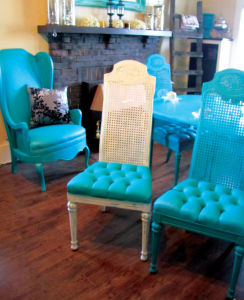 1. Wash your chair with a cloth to remove dust and dirt.
1. Wash your chair with a cloth to remove dust and dirt.
2. Grab a small bucket of water, a few rags, a paintbrush, a sanding sponge and your choice of Plaster Paint colour(s).
3. Shake your can of Plaster Paint, or stir well.
4. Paint the entire chair (including the fabric seat) with the base colour. This is the colour that will show through your top coat when you distress the project. A thin coat of paint works best.
5. Let the coat completely dry. It’s normal for the paint to dry a bit streaky.
6. Add a second coat of paint making sure to cover the entire surface. Let dry.
7. Add a top coat. This is the colour that you will see where you have not distressed the chair. Let this coat of paint dry until it does not come off if you lightly touch it with your finger.
8. It is now time to apply the “wet distress” technique. Grab a wet sanding sponge, and dip it into warm water. Wring it out and begin to lightly wash the edges and places you want your base coat to come through. You should concentrate on areas that would naturally be distressed by wear and tear. Let dry.
9. Now you are ready to seal your project. Use a dry brush or clean cloth (lint-free) and apply Plaster Paint Paste wax in a circular motion, almost like you are washing the chair. Reverse your direction, and lightly go back and forth to remove any excess wax.
10. Wait 5-10 minutes or when dry to the touch and buff (apply pressure) using a lint-free cloth or buffing brush. You will feel the project go from tacky to smooth and it will start to shine. – Text by Laurie Turmel, Plaster Paint Canada
As Seen In Canadian Home Trends Magazine Fall 2014
Latest posts by Canadian Home Trends (see all)
- Dining Room Design Tips - July 13, 2025
- Practical Luxury in Forest Grove - July 13, 2025
- The Hidden Value of Great Design - July 13, 2025







Oh yummy! How do I subscribe to your magazine?